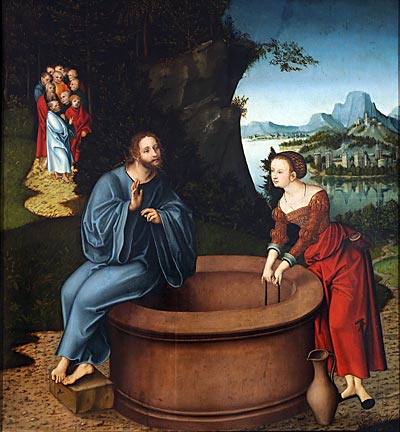Readings:
Genesis 24:12-20
Psalm 119:73-80
Colossians 2:16-23
John 4:4–26
Preface of Apostles and Ordinations
PRAYER (traditional language)
O Almighty God, whose most blessed Son didst reveal to the Samaritan woman that He is indeed the Christ, the Savior of the World; Grant us to drink of the well that springeth up to everlasting life that we may worship Thee in spirit and in truth through thy Son, Jesus Christ our Lord. Amen.
PRAYER (contemporary language)
O Almighty God, whose most blessed Son revealed to the Samaritan woman that He is indeed the Christ, the Savior of the World; Grant us to drink of the well that springs up to everlasting life that we may worship you in spirit and in truth through your Son, Jesus Christ our Lord. Amen.
Lessons revised at General Convention 2024.
Return to Lectionary Home Page
Webmaster: Charles Wohlers
Last updated: 28 Dec. 2024.
PHOTINI
THE SAMARITAN WOMAN (c. 67)
The Samaritan woman at the well is a figure from the Gospel of John, in John 4:4–26. In Eastern Orthodox and Eastern Catholic traditions, she is venerated as a saint with the name Photine (also Photini, Photina, meaning "the luminous one").
All that is known of her outside of pious traditions is in the Gospel of John:
Now when Jesus learned that the Pharisees had heard, ‘Jesus is making and baptizing more disciples than John’— although it was not Jesus himself but his disciples who baptized— he left Judea and started back to Galilee. But he had to go through Samaria. So he came to a Samaritan city called Sychar, near the plot of ground that Jacob had given to his son Joseph. Jacob’s well was there, and Jesus, tired out by his journey, was sitting by the well. It was about noon.
A Samaritan woman came to draw water, and Jesus said to her, ‘Give me a drink’. (His disciples had gone to the city to buy food.) The Samaritan woman said to him, ‘How is it that you, a Jew, ask a drink of me, a woman of Samaria?’ (Jews do not share things in common with Samaritans.) Jesus answered her, ‘If you knew the gift of God, and who it is that is saying to you, “Give me a drink”, you would have asked him, and he would have given you living water.’ The woman said to him, ‘Sir, you have no bucket, and the well is deep. Where do you get that living water? Are you greater than our ancestor Jacob, who gave us the well, and with his sons and his flocks drank from it?’ Jesus said to her, ‘Everyone who drinks of this water will be thirsty again, but those who drink of the water that I will give them will never be thirsty. The water that I will give will become in them a spring of water gushing up to eternal life.’ The woman said to him, ‘Sir, give me this water, so that I may never be thirsty or have to keep coming here to draw water.’

Jesus said to her, ‘Go, call your husband, and come back.’ The woman answered him, ‘I have no husband.’ Jesus said to her, ‘You are right in saying, “I have no husband”; for you have had five husbands, and the one you have now is not your husband." "What you have said is true!’ The woman said to him, ‘Sir, I see that you are a prophet. Our ancestors worshipped on this mountain, but you say that the place where people must worship is in Jerusalem.’ Jesus said to her, ‘Woman, believe me, the hour is coming when you will worship the Father neither on this mountain nor in Jerusalem. You worship what you do not know; we worship what we know, for salvation is from the Jews. But the hour is coming, and is now here, when the true worshippers will worship the Father in spirit and truth, for the Father seeks such as these to worship him. God is spirit, and those who worship him must worship in spirit and truth.’ The woman said to him, ‘I know that Messiah is coming’ (who is called Christ). ‘When he comes, he will proclaim all things to us.’ Jesus said to her, ‘I am he, the one who is speaking to you.’
Just then his disciples came. They were astonished that he was speaking with a woman, but no one said, ‘What do you want?’ or, ‘Why are you speaking with her?’ Then the woman left her water-jar and went back to the city. She said to the people, ‘Come and see a man who told me everything I have ever done! He cannot be the Messiah, can he?’ They left the city and were on their way to him.
...
Many Samaritans from that city believed in him because of the woman’s testimony, ‘He told me everything I have ever done.’ So when the Samaritans came to him, they asked him to stay with them; and he stayed there for two days. And many more believed because of his word. They said to the woman, ‘It is no longer because of what you said that we believe, for we have heard for ourselves, and we know that this is truly the Saviour of the world.’
In Eastern Christian tradition, the woman's name at the time of her meeting Jesus is unknown, though she was later christened "Photina". Her continuing witness is said to have brought so many to the Christian faith that she is described as "equal to the apostles". Eventually, having drawn the attention of Emperor Nero, she was brought before him to answer for her faith, suffering many tortures and dying a martyr after being thrown down a dry well.
more at Wikipedia